What you can and cannot be washed in a dishwasher: features of washing dishes from different materials
Household appliances for washing dirty dishes are increasingly found in domestic kitchens. The presence of a dishwasher greatly simplifies the life of the owners of the house, allowing you to free yourself from the routine at the kitchen sink.
However, far from everything in an automatic dishwasher can be put down for washing. There are plenty of materials, kitchen utensils from which should be kept away from this unit. We will tell you about what you can not wash in the dishwasher, and what is allowed.
The content of the article:
Dishwasher Cleaning Conditions
In the home kitchen, you have to constantly wash not only dishes and cutlery, but also a variety of cooking utensils. Forks, spoons, plates, glasses, cups, knives, cutting boards, pots, pans, etc. There is a huge amount of kitchen “inventory” in the arsenal of any housewife. And all this regularly gets dirty and requires washing.
To understand what you should not put in the PMM, you just need to imagine the conditions inside this technique after turning it on. For washing kitchen utensils in the dishwasher, a rather aggressive washing chemistry, coupled with hot water, is used. Not every material can withstand this without serious negative consequences.
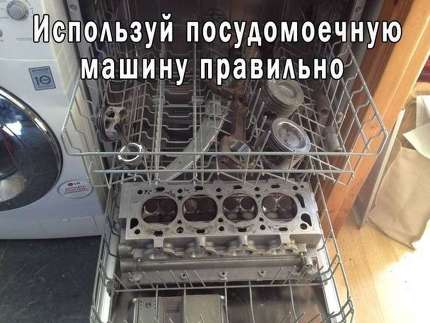
In general, four factors act on the dishes placed inside the PMM:
- Aggressive detergents.
- Water with a temperature up to + 50-750WITH.
- Long-term exposure to moisture (in some modes, the “wetting-washing-rinsing” cycle can last up to 4 hours).
- Hot air drying.
Washable utensils in a dishwasher should calmly tolerate the effects of all these factors. High temperature is not afraid of some materials, but household chemicals are harmful to them.
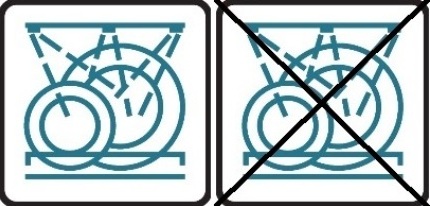
Others from a long stay in the water just swell. All things to consider what happens inside the PMM with cutlery in the complex.
In addition to everything, in any kitchen there are lots of old cutlery on which there are no such tags initially. In Soviet times, no one even thought about the need for such markings.
PMM were then used only in large dining rooms. And there they knew which dishes should be washed in an automatic dishwasher from the remnants of food, and which not.
What is allowed to wash in PMM?
There are many cutlery that can withstand washing in a dishwasher. Most of the dishes and utensils for cooking can be washed without restrictions in the dishwasher. How to load correctly kitchen utensils in the hopper of the machine, you will learn from the article recommended by us.
Pots, pans, and many tableware are made from materials that are designed to withstand high temperatures and moisture without harming themselves.
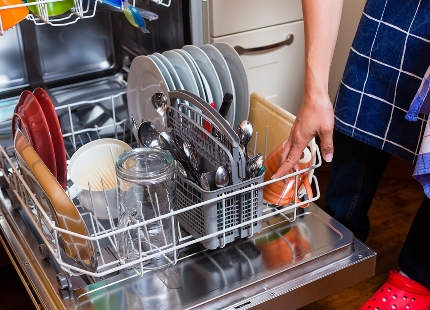
Without restriction, washing in a dishwasher allows dishes from:
- food-grade plastic and heat-resistant silicone;
- of stainless steel;
- cupronickel;
- ordinary and heat-resistant glass;
- ceramics (with the exception of objects with a pattern painted on top of the burned surface);
- enamelled metals.
The hardest thing with plastic items. Plastic is not just one material, but a whole group with various characteristics and properties. Some of them can be sent for washing in the PMM, while others are categorically not. The main point here is the melting point of a particular type of plastic.
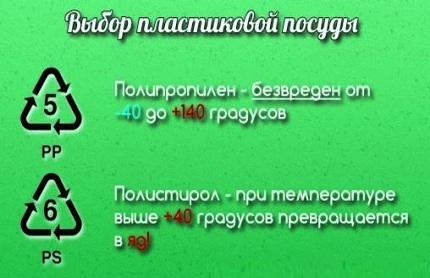
Plastic dishes should only be washed in an automatic dishwasher if they are reusable. Disposable cups and plates made of plastic in the PMM should not be placed in any case. Such items are made from cheap plastics, which are not designed for both long-term and even short-term exposure to hot water or steam.
The most hassle-free material is stainless steel. The dishes and utensils from it are not afraid of prolonged exposure to moisture, a temperature of 60–750C and household chemicals. A similar situation is with cupronickel. This copper alloy even begins to shine after washing in heated water.
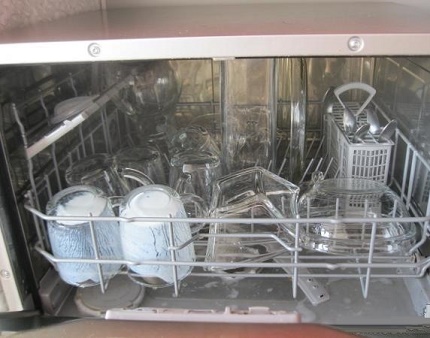
Glassware, especially if it is specifically designed for cooking on the stove, also easily transfers washing in a dishwasher. Sudden changes in temperature are dangerous for ordinary glass, but in the PMM, cold water from the tap is not used during rinsing.
It is still slightly warmed up by the heater. So problems and destructive consequences in the form of cracks should not arise.
Pottery can be washed in a dishwasher, but only one that does not have drawings on the surface. Images drawn over burnt ceramics in the PMM are necessarily cracked. At the same time, dropped pieces can harm the machine itself, clogging its filters. The same goes for porcelain.
You can put porcelain cups and plates for automatic washing in PMM. However, you need to look so that the pattern on them is under the glaze. If the pattern is applied on top (extremely rare for porcelain, but it happens), then it is better to wash such dishes manually. It is important to choose processing cycle and set the washing temperature lower - up to +500WITH.
Hotter water will not harm such cutlery. However, with sudden changes in temperature, they can crack. In general, for glass, ceramics and porcelain in the PMM settings there is usually a special mode with “delicate” machine operation parameters.
Stop list for dishwashers
Regardless of the material of manufacture, it is forbidden to wash dishes and any items with stickers in the dishwasher. These pieces of paper necessarily “peel off” from the surface being cleaned and fall into the filters.
The consequences are predictable - PMM with high probability will immediately break. It’s good if protective automation works, otherwise you will have to call a specialist to fix the equipment or give it to the service.
Aluminum and silver products
Hot water in PMM aluminum and silver is not scary. However used when washing household chemicals extremely harmful to them. Utensils made of these metals, after being in the dishwasher, begin to darken and become covered with plaque.
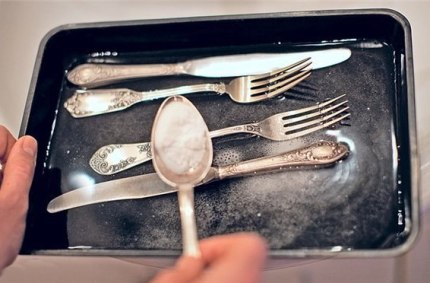
During prolonged interaction with water, aluminum releases ions. If you put a lot of aluminum utensils in the dishwasher at the same time for two to three hours, then everything inside will be “painted” with the appropriate metal coating.
Moreover, aluminum will not only cover the internal walls of the PMM, but can also clog the nozzles on the sprinklers. Failure and subsequent dishwasher repair in this case is inevitable.
A video with clear explanations about why you cannot wash aluminum kitchen utensils in the PMM:
Wooden and cast iron objects
Wood and water are not very compatible materials. Wooden shovels, cutting boards and rolling pins are best washed by yourself. They in the PMM first swell from an excess of moisture, and then dry out under the influence of high-temperature air drying.
The result will be cracked utensils unsuitable for further use as intended. Now many wooden cutting boards are not made from a single piece of wood, but from glued parts. If such a prefabricated product is kept in water for a long time, then it can fall apart into separate elements.
And if it does not crumble into parts, then in places of gluing it will definitely disperse. In this case, the consequences are even worse - the glue from the board will subsequently enter the body with food.
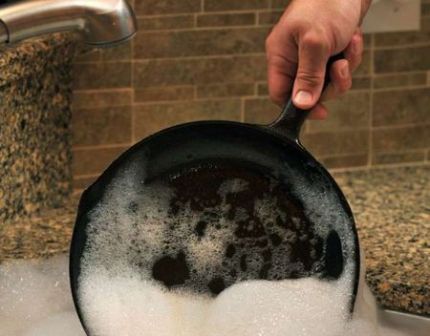
Cast iron pans, cauldrons, and pots are eventually coated with a thin film of fat. It protects this metal from water and oxygen, which prevents the formation of rust on such utensils.
With a manual wash, greasy deposits are never completely washed off, but with an automatic wash with a lot of detergent, it disappears. And then unprotected cast iron begins to rust.
Knives, strainers and garlic presses
Knives made of stainless steel after a long stay in the dishwasher become slightly dull. That is, the PMM material itself is not afraid. However, the knife after such a washing will have to be sharpened again.
This also applies to graters and any other sharp-edged utensils for cutting food. They can not only become dull, but also scratch the inner walls and mechanisms of the washer.
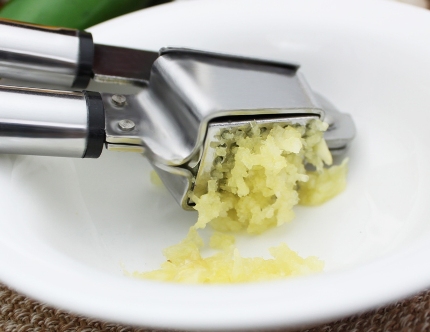
Strainers, graters, vegetable cutters and devices for curly cutting products will have to be washed by hand. There are a lot of small notches and recesses on them, where after cooking particles of vegetables, fruits, meat, etc. remain. Sprays sprayed by nozzles in the dishwasher technique cannot wash such “crumbs”. You can only clean them out manually.
It is also not recommended to put knives and other parts of the meat grinder in the dishwasher. On the one hand, the cutting edges are dull, and on the other, the metal of which this machine is made is oxidized. Then you have to clean the blackened surfaces with abrasive powders with your hands.
Thermos and crystal products
Often thermoses are arranged so that the flask in them has a wrapper made of heat-insulating material. However, when wet, thermal insulation not only loses its properties, but also deteriorates. Plus, the effects of chemistry from the “soap” with incomprehensible consequences. Even after complete drying, the insulation will not retain heat as well as before.
Thermos should be washed exclusively with hands. Do not put it in water for long and steam. And to do this is not recommended, even if it does not have a heat insulator.
There is always an empty space between the outer case and the bulb. If you do not disassemble, then the water that gets there will not dry completely. And as a result - unpleasant musty amber.
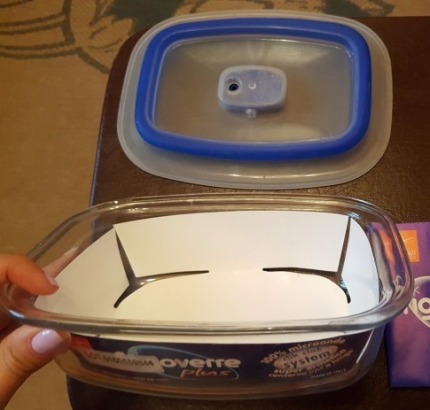
Some crystal products can be washed in the dishwasher. However, not all: there are many different varieties of crystal, and most of them have temperatures above +500C contraindicated. The consequences of such heating are microcracks inside the crystal glass. For crystal products in expensive PMM special programs are provided.
Putting glassware in cheap dishwashing equipment is allowed only if it is allowed by the manufacturer of such dishes. On the packaging of this product should be a clear indication of "possible."
If the box from under the crystal vase is not at hand, then it’s not worth the risk. Crystal from heating can crack or tarnish and become cloudy. But prettier after washing in the machine with specialized means he certainly won't.
Once again about misuse
The main thing that categorically cannot be washed in PMM is utensils made of aluminum, copper, tin, cast iron, wood and some types of plastic. The rest is permitted without restriction or with certain reservations.
The dishwasher has several modes of operation with different water temperatures. For example, thin glass and porcelain are best washed with “delicate” settings + 40-500C. It’s not worth the risk of washing them at higher temperatures. They may crack.
It is not recommended to wash clay pots without glaze in PMM. They do not crack, but are gradually saturated with substances from washing tablets and liquids. Moisture will come out of the porous clay with further use, and the chemistry will remain inside. The consequences in the form of an unpleasant smell are unlikely to please anyone.
The dishwasher is a great place to disinfect sponges for dishes. Hot water not only launders kitchen accessories, but also saves them from germs.
In detail with the rules for operating the dishwasher next article, which is worth reading for both the future and the “present” owners of useful and convenient appliances.
Conclusions and useful video on the topic
The following selection of videos will help to understand all the nuances that are allowed and forbidden to put in a dishwasher for washing.
Once again about the prohibited use of the dishwasher:
Dishwasher - very necessary in the kitchen and easy to operate equipment. But it is not allowed to wash all types of dishes. There are a number of materials for which utensils such a washing is contraindicated. One must be careful not to spoil the cutlery and not break the dishwasher.
Tell us about what and how you load in the dishwasher. Share your secrets of operating this type of household appliance. Please leave comments in the block below, ask questions and post a photo on the topic of the article.

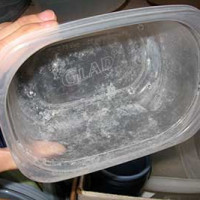 Why does white plaque appear in the dishwasher and how to get rid of it
Why does white plaque appear in the dishwasher and how to get rid of it 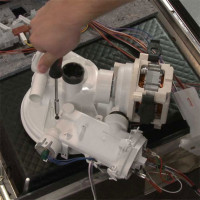 The water sensor in the dishwasher: types, device, how to check + repair
The water sensor in the dishwasher: types, device, how to check + repair 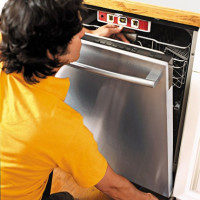 The first start of the dishwasher: how to properly carry out the first inclusion of equipment
The first start of the dishwasher: how to properly carry out the first inclusion of equipment 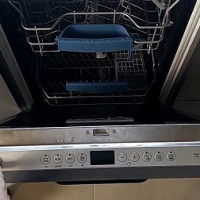 Overview of the Bosch SPV47E40RU dishwasher: economical consumption of resources when washing class A
Overview of the Bosch SPV47E40RU dishwasher: economical consumption of resources when washing class A 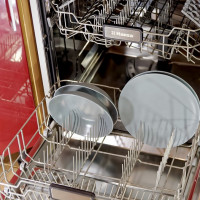 Hansa ZIM 476 H dishwasher overview: functional assistant for one year
Hansa ZIM 476 H dishwasher overview: functional assistant for one year 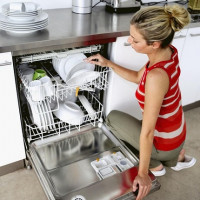 Which dishwasher detergent is better: high-performance detergent rating
Which dishwasher detergent is better: high-performance detergent rating 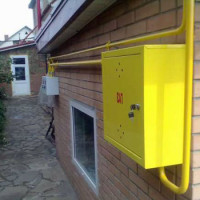 How much does it cost to connect gas to a private house: the price of organizing gas supply
How much does it cost to connect gas to a private house: the price of organizing gas supply  The best washing machines with dryer: model rating and customer tips
The best washing machines with dryer: model rating and customer tips 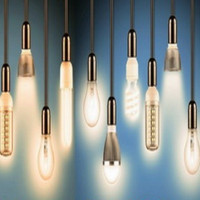 What is the color temperature of light and the nuances of choosing the temperature of the lamps to suit your needs
What is the color temperature of light and the nuances of choosing the temperature of the lamps to suit your needs 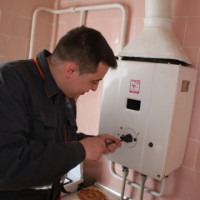 Replacement of a geyser in an apartment: replacement paperwork + basic norms and requirements
Replacement of a geyser in an apartment: replacement paperwork + basic norms and requirements
Yes, when I bought a dishwasher and I could not think that it is impossible to wash so many items in it. To the list of prohibitions that are listed here, it is worth adding that it is impossible to wash cracked or glued dishes in the dishwasher. So your favorite mug with a crack will have to be washed by hand. Also, of course, you can not wash elegant wine glasses and glasses.
You are right, in the dishwasher you cannot wash elegant dishes made of glass and porcelain. But you can do the following:
- Carefully arrange the dishes so that they stand as tightly as possible and do not move;
- pour a suitable product into the rinse compartment (there are special ones for glass);
- Do not use powder or tablets!
- start the “Rinse” or “Soak” mode for up to 15 minutes.
As a result, the dishes will become clean and shiny.
In the dishwasher, I try to wash only plates, forks, spoons, cups and some pans. And yet all this must be compactly accommodated in it. Wooden boards, spoons, overturns, as well as plastic spoons and cast-iron pans, I wash only by hand. Personally, the dishwasher simplifies my life significantly, since washing dishes no longer takes my time.